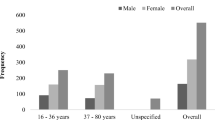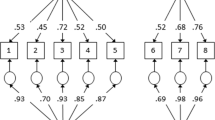Abstract
Reminiscence is proposed as an important activity for well-being in late life but recent reviews highlight the differential outcomes of this behavior. If older adults engage in reminiscing as a natural process, but do so with a ruminative style of thinking, it may actually be detrimental to successful development and well-being. This project explored the relationship between rumination, reminiscence, mood, and psychosocial development. One hundred and fifty community dwelling older adults completed measures assessing these variables. As expected, increased rumination was related to increased depressed mood. Fifty-four of the participants completed a follow-up measure of depressed mood. Rumination also accounted for follow-up depressed mood beyond that explained by time-1 mood. The interaction between rumination and reminiscing significantly predicted future depressed mood after controlling for main effects and baseline mood. Further, this interaction significantly predicted overall psychosocial development. Implications for clinical practice are discussed.
Similar content being viewed by others
References
Bohlmeijer E, Roemer E, Cuijpers P, Smit F (2007) The effects of reminiscence on psychological well-being in older adults: a meta-analysis. Aging Ment Health 11:291–300
Brinker JK, Dozois DJA (2009) Ruminative thought styles and depressed mood. J Clin Psychol 65:1–19
Butler RN (1963) The Life review: an interpretation of reminiscence in aged. Psychiatry 26:65–78
Butler LD, Nolen-Hoeksema S (1994) Gender differences in response to depressed mood in a college sample. Sex Roles 30:331–346
Cappeliez P, O’Rourke N (2002) Profiles of reminiscence among older adults:perceived stress, life attitudes, and personality variables. Int J Aging Hum Dev 54:255–266
Cappeliez P, O’Rourke N (2006) Empirical validation of a model of reminiscence and health in later life. J Gerontol Psychol Sci 61B:237–244
Chin AMH (2007) Clinical effects of reminiscence therapy in older adults: a metaanalysis of controlled trials. Hong Kong J Occup Therapy 17:10–22
De Luca CR, Wood SJ, Anderson V, Buchanan J, Proffitt TM, Mahony K, Pantelis C (2003) Normative Data from Cantab. I: development of executive function over the lifespan. J Clin Exp Neuropsychol 25:242–254
Erikson EH (1959) Identity and the life cycle. International Universities Press, New York
Eshun S (2000) Role of gender and rumination in suicide ideation: a comparison of college samples from Ghana and the United States. Cross-Cultural Res 34:250–263
Hawley GA (1988) Measure of psychosocial development: professional manual. Psychological Assessment Resources Ltd, Odessa
Joseph S, Lewis CA (1998) The depression-happiness scale: reliability and validity of a bipolar self report scale. J Clin Psychol 54:537–544
LoGerfo M (1980) Three ways of reminiscence in theory and practice. Int J Aging Hum Dev 12:39–48
Morrow J, Nolen-Hoeksema S (1990) Effects of responses to depression on the remediation of depressive affect. J Pers Soc Psychol 58:519–527
Nolen-Hoeksema S (2000) The role of rumination in depressive disorders and mixed anxiety/depressive symptoms. J Abnorm Psychol 109:504–511
Torges CM, Steward AJ, Nolen-Hoeksema S (2008) Regret resolution, aging and adapting to loss. Psychol Aging 23:169–180
Tornnstam L (1999) Gerotranscendence and the functions of reminiscence. J Aging Identity 4:155–166
Webster JD (1993) Construction and validation of the reminiscence functions scale. J Gerontol Psychol Sci 48:256–262
Westerhof GJ, Bohmeijer E, Webster JD (2010) Reminiscence and mental health: a review of recent progress in theory, research and interventions. Aging Soc 30:697–721
Wong PTP, Watt LM (1991) What types of reminiscence are associated with successful aging? Psychol Aging 6:272–279
Author information
Authors and Affiliations
Corresponding author
Additional information
Responsible Editor: Howard Litwin.
Rights and permissions
About this article
Cite this article
Brinker, J.K. Rumination and reminiscence in older adults: implications for clinical practice. Eur J Ageing 10, 223–227 (2013). https://doi.org/10.1007/s10433-013-0271-y
Published:
Issue Date:
DOI: https://doi.org/10.1007/s10433-013-0271-y




